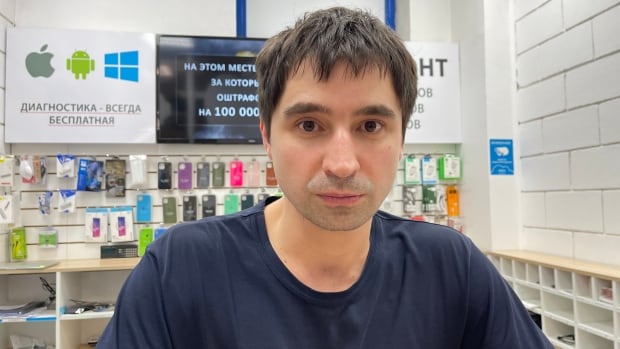
New laws aim to crush even mild forms of protest in Russia
CBC
In the early days of Russia's invasion of Ukraine, Marat Grachev and his staff at his computer repair store in Moscow discussed how to voice their opposition in an environment where any dissent is silenced.
Grachev, 35, thought taking to the streets seemed futile, as demonstrators were being dragged away by the police moments after brandishing signs.
So they came up with a digital solution.
On one of their computer monitors, they put the words "No War" in Russian, in the hopes the act would send a longer-lasting message to those who frequented his business.
The sign lasted until March 31.
"We are pleasantly surprised that we were able to work for a whole month and our clients did not turn us in," Grachev told CBC in an interview at his store in Moscow.
But that changed when a passerby noticed the screen and told the staff he would call the police if they didn't take it down.
When they didn't, officers showed up on March 31. Grachev recorded the interaction as a police officer grabbed the remote to turn off the monitor and started questioning all his staff, demanding they come down to the station.
When Grachev asked if they could refuse, an officer told him that if they did, the police could take them by force. Grachev was eventually fined 100,000 rubles, the equivalent of about $1,500 Cdn.
Grachev is one of at least 400 people who have been fined or detained under new Russian laws that target anyone deemed to be discrediting the military or publishing and sharing fake news, according to OVD-info, a Moscow-based human rights group that is providing legal support in about a quarter of the cases.
Authorities have cracked down even on benign forms of protest, including a person holding up a piece of paper, which apparently represented "No War" in Russian, and a man giving away copies of George Orwell's dystopian novel, 1984.
A woman in Crimea was also reportedly detained after someone thought her blue and yellow manicure was too political — because her nails were done in the colours of Ukraine.
Legal watchers say there has been a change in rhetoric from government officials, including Russian President Vladimir Putin, encouraging citizens to root out those who don't support what the country insists on calling its "special military operation" in Ukraine.
Priests, teachers and activists have all been detained and fined. Some face the prospect of years in custody.

Some Syrians are going home a year after the fall of Assad. Others are cautious about a one-way trip
At the Öncüpınar border crossing in southern Turkey, tables, chairs and sofas are piled high on the back of trucks lined up behind a gate. On the back of one sits a precariously strapped washing machine.












